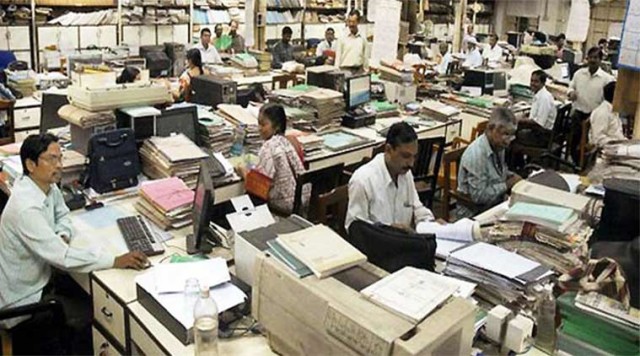It was not all that long ago that the ‘Government Job’ was a much sought-after career. It raised visions of a good work-life balance, a predictable career path and a healthy amount of pay, with a pension to look forward to when retirement came around.

Things are rather less simple now. Though the demand for jobs in the public sector and in government continues to be as high as ever, the reality of a life as a public servant is rather less attractive than it would at first appear. At the higher end of the spectrum – the IAS and other Civil services, there is definitely a lot to be said for Government employment. Pay scales and perks are respectable, and these are some of the highest-paid people within the government, though they too, have to please their political masters.
Galloping inflation has been the biggest enemy of all our incomes, not just government employees. After fixed-income earners, they have been the worst hit. Despite successive pay commissions making seemingly-generous payouts to the ranks of government servants, the fact remains that the hikes have not always been in line with the increase in prices. The Pay commissions, besides, are constituted once every five years or so, whereas a private company employee knows that the salary structure is at least eligible for revision at every annual board meeting, sometimes even more frequently.
Moreover, compared to private sector organisations, the increment and promotion cycle in Government jobs is very slow. Even the most conservative Bank or IT company still makes an employee eligible for promotion every three years. For more aggressive companies, it can be as less as one year. A government employee must put in five years at one grade to be eligible for a promotion.
Another negative affecting the average government employee is the simple fact of the pay itself being lower. On an average, even after recent revisions in grade pay, a similarly-qualified person working in a private organisation would expect to make at least one and a half times as much as his counterpart in a government office.
This ties in to another problem, which is rising property prices. While inflation tends to go up and down over a period of time, the housing market has only risen steadily in the past thirty years. Once, a government employee, after living in the staff quarters during his or her working lifetime, could look to buying a pleasant home to spend retirement out of the savings and Provident Fund, while the pension took care of his daily needs. Now, he would be lucky if the Provident Fund pays for the down-payment, and then of course, no Bank gives a home loan to a retiree! Add to that the sword hanging over all our heads right now – the possibility that the government might again impose a tax on the withdrawal of EPF balances (though the proposal was rolled back in this session) which would significantly impact the overall lifestyle of retirees.
To add to all this, is the rising burden of taxes. Income tax affects us all, but as is well-known, it affects the salaried class more than others, since they are unable to set off any expenses whatsoever against the amounts they spend. Deductible allowances have been frozen for over fifteen years now, and a transportation allowance of Rs 800 per month is just laughable. Similarly, the inability of a government employee to structure his salary at all means that there is no scope to reduce his or her tax burden even with effective tax planning. Indirect taxes like service tax and VAT, ever on the increase, continue to take a toll, and leaves the government staff at the bottom of the figurative pyramid of salaried workers.
Is there a solution in sight? As such, beyond bringing about competitiveness in pay scales, the most important thing that the government needs to do is concentrate on reducing inflation as well as keeping the realty market in check. After all, a government whose own employees are in a state of uncertainty and unhappiness is not likely to be a very long-lasting one!
–































